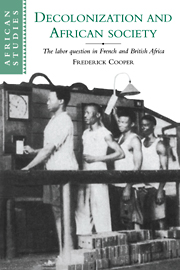Crossref Citations
This Book has been
cited by the following publications. This list is generated based on data provided by Crossref.
Pels, Peter
1997.
The Anthropology of Colonialism: Culture, History, and the Emergence of Western Governmentality.
Annual Review of Anthropology,
Vol. 26,
Issue. 1,
p.
163.
White, Luise
1997.
The traffic in heads: bodies, borders and the articulation of regional histories.
Journal of Southern African Studies,
Vol. 23,
Issue. 2,
p.
325.
Berman, Bruce J.
1997.
The Perils of Bula Matari: Constraint and Power in the Colonial State.
Canadian Journal of African Studies / Revue canadienne des études africaines,
Vol. 31,
Issue. 3,
p.
555.
Greenstein, Ran
1998.
Comparative Perspectives on South Africa.
p.
1.
Grischow, Jeff
1998.
Corruptions of development in the countryside of the Northern Territories of the Gold Coast, 1927–57.
Journal of Peasant Studies,
Vol. 26,
Issue. 1,
p.
139.
Vickery, Kenneth P.
1998.
The Rhodesia railways African strike of 1945, part I: a narrative account.
Journal of Southern African Studies,
Vol. 24,
Issue. 3,
p.
545.
Malkki, Liisa
1998.
Things to Come: Internationalism and Global Solidarities in the Late 1990s.
Public Culture,
Vol. 10,
Issue. 2,
p.
431.
Sunseri, Thaddeus
1998.
“Dispersing the Fields”: Railway Labor and Rural Change in Early Colonial Tanzania.
Canadian Journal of African Studies / Revue canadienne des études africaines,
Vol. 32,
Issue. 3,
p.
558.
Whitehead, Ann
1999.
'Lazy men', time-use, and rural development in Zambia.
Gender & Development,
Vol. 7,
Issue. 3,
p.
49.
Bryceson, Deborah
Fahy
1999.
African rural labour, income diversification & livelihood approaches: a long‐term development perspective.
Review of African Political Economy,
Vol. 26,
Issue. 80,
Hargreaves, John
1999.
French Colonial Empire and the Popular Front.
p.
74.
Shipway, Martin
1999.
French Colonial Empire and the Popular Front.
p.
131.
Saville, Julie
1999.
Rites and power: Reflections on slavery, freedom and political ritual.
Slavery & Abolition,
Vol. 20,
Issue. 1,
p.
81.
Seidman, Gay
1999.
IS SOUTH AFRICA DIFFERENT? Sociological Comparisons and Theoretical Contributions from the Land of Apartheid.
Annual Review of Sociology,
Vol. 25,
Issue. 1,
p.
419.
Bazin, Laurent
1999.
La parenté : miroir et enlisement des hiérarchies en Côte-d’Ivoire.
Journal des anthropologues,
p.
193.
Wilder, Gary
1999.
French Colonial Empire and the Popular Front.
p.
33.
Kras, Stefan
1999.
Senghor's Rise to Power 1948–1951. Early Roots of French Sub-Saharan Decolonisation.
Itinerario,
Vol. 23,
Issue. 1,
p.
91.
Darwin, John
1999.
What Was the Late Colonial State?.
Itinerario,
Vol. 23,
Issue. 3-4,
p.
73.
Ribot, Jesse C.
1999.
Decentralisation, participation and accountability in Sahelian forestry: legal instruments of political-administrative control.
Africa,
Vol. 69,
Issue. 1,
p.
23.
Diouf, Mamadou
1999.
Privatisations des économies et des États africains.
Politique africaine,
Vol. N° 73,
Issue. 1,
p.
16.





